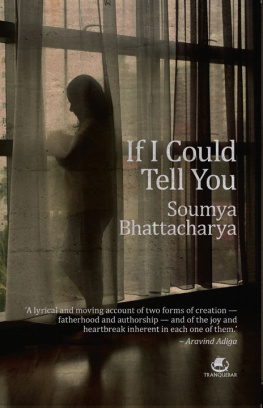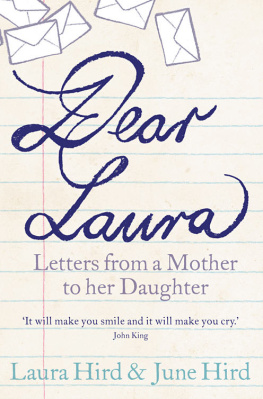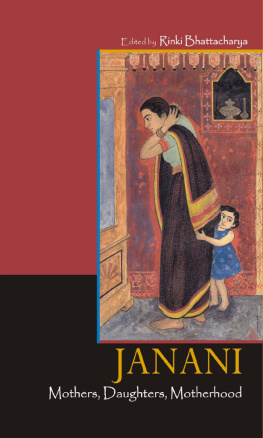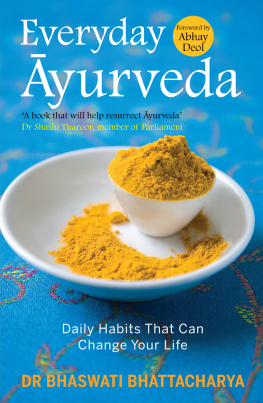ALSO BY SOUMYA BHATTACHARYA
YOU MUST LIKE CRICKET?: MEMOIRS OF AN INDIAN CRICKET FAN
Beautifully written. Bhattacharya uses his anecdotes tellingly to flesh out his argument about the way cricket has taken hold of a country.
The Times (London)
Heir to a tradition harking back to crickets first literary classic. Highly entertaining.
Mike Marqusee, The Guardian (London)
An engaging book, [the writing has] plenty of verve and charm. The subtitleMemoirs of an Indian Cricket Fancould easily (and accurately) be rejigged to Memoirs of Every Indian.
TimeOut
Its not so much about cricket as about an obsession. It is an illumination of the place cricket holds in the minds of most of us. Even if your answer to the question in the tide is a resounding NO, you like the book.
Hindustan Times
An amusing and thoughtful memoir, an engaging chronicle by someone who knows not only cricket but his country and the wider world.
The Age (Melbourne)
Bhattacharya writes in a fluid, conversational style. [Renders] the intimate intensity of the fans world while also placing it in a broader context.
The Sydney Morning Herald
Lovingly written, fascinating. Some mouldering cliches are chucked out.
The Wisden Cricketer
TRANQUEBAR PRESS
An imprint of westland ltd
571, Poonamallee High Road, Kamaraj Bhavan, Aminijikarai, Chennai 600 029
No.38/10 (New No.5), Raghava Nagar, New Timber Yard Layout, Bangalore 560 026
Survey No. A-9, II Floor, Moula Ali Industrial Area, Moula Ali, Hyderabad 500 040
Plot No 102, Marol Coop Ind Estate, Marol, Andheri East, Mumbai 400 059
47, Brij Mohan Road, Daryaganj, New Delhi 110 002
First published in India by TRANQUEBAR PRESS 2009
Copyright Soumya Bhattacharya 2009
All rights reserved
10 987654321
ISBN: 978-93-80283-26-5
This edition for sale in the Indian Subcontinent only
Typeset in Adobe Garamond by SURYA, New Delhi Printed at Manipal Press Ltd., Manipal
This book is sold subject to the condition that it shall not by way of trade or otherwise, be lent, resold, hired out, circulated, and no reproduction in any form, in whole or in part (except for brief quotations in critical articles or reviews) may be made without written permission of the publishers.
O ISHI. T HAT IS WHAT I NAMED YOU, THAT DRUNKEN, DELIRIOUS , hope-filled evening, twelve hours after you had been born. I think, as you get older, you will get asked this question. I may as well tell you now, at the outset. In Bengali, your name means divine; in Japanese, delicious.
I always wanted to claim for myself the privilege of having named you. Not that anyone was competing with me for the favour. For the Bengali meaning of your name, I have my Chalantika, my worn, thick Bengali dictionary, to thank. Its cover is red and rough, and my fingers, when I stroke it, scrape against it. It was one of the things my mother had left me.
The evening you were born, I went through the dictionary with the purpose of finding a name for you. It was not so much to exclude your mother from the exercise but to hug to myselfand only to myselfthe pleasure of it. So I riffled through the pages and sipped my vodka, twirling the glass every now and then. The silence of the flat amplified the sound of the ice cubes chiming in the glass.
It wasnt merely to do with how the word sounded, though. Your name had to be just right. I had my own criteria for it. It had to be short. It had to be, unlike mine, phonetic. It had to be, for a Bengali child, unusual. The meaning had to be appropriate.
Oishi, in Bengali, seemed to me to have all those qualities. It also seemed to embody that particular evening, when life seemed more full of possibilities than it had ever done.
The other meaning I found out much later when, while wandering in a supermarket aisle in Canberra, I stumbled upon a packet of instant noodles that had been made in Japan. I bought it on that occasion and several times afterwards. That day, as I stood outside the store clutching the Oishi noodles in a brown paper packet, the heat seemed to rise like mists of morning vapour from the pavement. One did not sweat in this sort of climate. It was almost as if the heat dried out the sweat before it could properly form. The double glass doors swung to and fro every time someone went in or out. The draught of the air-conditioning, emitted every time the doors opened and closed, was divine. We, your mother and I, loved the noodles. They were delicious. You never quite acquired the taste for it.
You were born at half-past seven in the morning. That evening, I had not yet come to terms with what having you with us actually meant. I had not had to do any of the hard work. Your mother had done all of that. I felt no more grown up or no different from the evening before. I wondered if this was how it was supposed to be. It hardly seemed the life-altering event I had been led to believe it was, or, indeed, was expecting it to be. It had been, as I have said, only twelve hours.
So I drank blackcurrant vodka and keenly consulted my Chalantika. Absolut concentration. There was nothing for me to do. We had few friends in the new city to which we had moved. We had no family there.
I became properly aware of the fact that I had become a father when I sat down to write the emails the following morning.
The transforming moment ought to have come when I first saw you. (If nothing else, it seems neater, more fitting that way.) But it had not. I had seen you, for the first time, squirming and blood-spattered, moments after you had been born, and had kept asking if everything was normal. It seemed to be, to the exclusion of everything else, the one thing that I was obsessed with. In the nursing home, they did not allow the fathers into the labour room. In Calcutta in 2001, it was still unprecedented, even inappropriate. Our elderly, gruff gynaecologist looked thoroughly disapproving at my suggestion. The nursing home authorities would of course have none of it.
There was little chance of holding your mothers hand, of participating, in whatever remote and peripheral way, in the moment of your coming into the world. As it turned out, your mother had a Caesarian section.
There was a tiny waiting area adjacent to the operating theatre. Through the plate-glass window running across one wall, I could see the playing fields of a school. The sofa on which I sat was little more than a narrow bench with a coir mattress thrown over it. Some of the stuffing had come out of one of the corners. It was lumpy where I sat and I kept shifting, wiggling to make myself less uncomfortable. There were two other people on that sofa, one of them an expectant father. My wife is in the other operating theatre, but there is no place to sit in the waiting area over there, he had told me when we had first caught ourselves looking at each other. He smiled, awkwardly, nervously, running his hand obsessively over the stubble on his cheeks as though his index finger was a safety razor. After a while, I got up and went and stood in front of the window.













